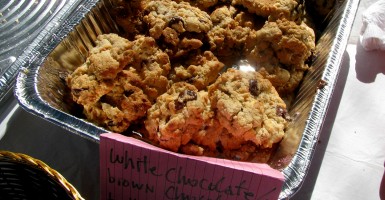South Carolina student groups looking to raise money should get out their baking supplies.
Schools in the state will soon be able to apply for waivers to sell food that isn’t in compliance with federal nutrition standards in order to facilitate fundraising.
South Carolina’s State Education Superintendent Molly Spearman announced in a statement that the state will ease some of the restrictions of the Healthy, Hunger-Free Kids Act of 2010.
On July 1, 2014, the “Smart Snacks” provision of the legislation championed by first lady Michelle Obama went into effect. It banned the sale of what was deemed junk food during the school day.
The regulation extends to the types of food sold at bake sales, traditionally a fundraising opportunity for student, parent and volunteer organizations.
In her statement, Spearman said there will no longer be a complete ban on prohibited food during the school day in an attempt to accommodate fundraising opportunities for schools and students.
“Fundraisers provide vital income for extracurricular activities that are also essential for our children’s development, such as band, sports and field trips,” said Spearman.
“We need a reasonable balance that does not prohibit school districts from exercising their discretion to permit infrequent fundraisers that include foods that do not meet the ‘Smart Snacks’ requirements, such as bake sales or special treats sold by student organizations,” she added.
Schools must still apply for a waiver to sell prohibited snacks for fundraising activities. Applications then must be approved by both the school principal and the district superintendent.
During the 2015-2016 school year, schools may apply for 30 waivers, each good for three days. The waivers will decrease to two days in 2016-2017, and one day in 2017-2018. For the remainder of the current school year, schools can apply for 13 permits, each good for up to three days.
According to Greenville Online, the Greenville County School Board sent a letter to Spearman to thank her for allowing more local decision making.
“This flexibility allows our schools to determine, with their local communities, the appropriate balance between honoring our commitment to strong nutritional standards and permitting the occasional special fundraiser,” the letter said.
Daren Bakst, a research fellow in agricultural policy at The Heritage Foundation, said local communities should be able to make decisions about what is best for their students.
“Similar to the federal government, states need to respect local decisions about food provided to students in schools,” said Bakst. “South Carolina is taking action that respects local decisions. This issue is beyond merely helping student groups, it is also about bureaucrats not micromanaging what kids can eat in school.”




























